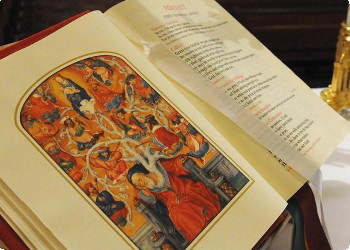They were all filled with fury
4 MARCH (Lk 4,24-30)
How hard is it to change thoughts. Yet the whole history of Israel is a fantastic tool for this to happen. Perhaps that the great King David was not before a humble person, so humble as to not even be summoned by his father to be present at the offering of the sacrifice that Samuel made in honour of the Lord along with his entire family? Why could a humble David become the very great king of Israel and the most humble Christ Jesus cannot be God’s Messiah? What arcane logic separates the two things to such a point that today Jesus risks of being even killed? The history of David should instead help us think differently. Human humility is the subject through which the Lord creates the great men in our history.
The Lord said to Samuel: “How long will you grieve for Saul, whom I have rejected as king of Israel? Fill your horn with oil, and be on your way. I am sending you to Jesse of Bethlehem, for I have chosen my king from among his sons.” But Samuel replied: “How can I go? Saul will hear of it and kill me.” To this the Lord answered: “Take a heifer along and say, ‘I have come to sacrifice to the Lord.’ Invite Jesse to the sacrifice, and I myself will tell you what to do; you are to anoint for me the one I point out to you.” Samuel did as the Lord had commanded him. When he entered Bethlehem, the elders of the city came trembling to meet him and inquired, “Is your visit peaceful, O seer?” He replied: “Yes! I have come to sacrifice to the Lord. So cleanse yourselves and join me today for the banquet.” He also had Jesse and his sons cleanse themselves and invited them to the sacrifice. As they came, he looked at Eliab and thought, “Surely the Lord’S anointed is here before him.” But the Lord said to Samuel: “Do not judge from his appearance or from his lofty stature, because I have rejected him. Not as man sees does God see, because man sees the appearance but the Lord looks into the heart.” Then Jesse called Abinadab and presented him before Samuel, who said, “The Lord has not chosen him.” Next Jesse presented Shammah, but Samuel said, “The Lord has not chosen this one either.” In the same way Jesse presented seven sons before Samuel, but Samuel said to Jesse, “The Lord has not chosen any one of these.” Then Samuel asked Jesse, “Are these all the sons you have?” Jesse replied, “There is still the youngest, who is tending the sheep.” Samuel said to Jesse, “Send for him; we will not begin the sacrificial banquet until he arrives here.” Jesse sent and had the young man brought to them. He was ruddy, a youth handsome to behold and making a splendid appearance. The Lord said, “There-anoint him, for this is he!” Then Samuel, with the horn of oil in hand, anointed him in the midst of his brothers; and from that day on, the spirit of the Lord rushed upon David. When Samuel took his leave, he went to Ramah. (1Sam 16,1-13).
We read the Scripture, but for us it has no value of revelation. We regard it as something of the past. We are not able to see in it the holy footsteps of God that are almost always the same for the past, for the present and for the future. History changes, but the footprints are those of yesterday. The mission of the King of Israel changes; on the contrary, the material of which the Lord uses to create his new King does not change: the social and economic humility, familiar of Jesus of Nazareth. This man is so humble as to be considered unfit to be the King of Israel.
And he said, “Amen, I say to you, no prophet is accepted in his own native place. Indeed, I tell you, there were many widows in Israel in the days of Elijah when the sky was closed for three and a half years and a severe famine spread over the entire land. It was to none of these that Elijah was sent, but only to a widow in Zarephath in the land of Sidon. Again, there were many lepers in Israel during the time of Elisha the prophet; yet not one of them was cleansed, but only Naaman the Syrian.” When the people in the synagogue heard this, they were all filled with fury. They rose up, drove him out of the town, and led him to the brow of the hill on which their town had been built, to hurl him down headlong. But he passed through the midst of them and went away.
It is difficult to know the footsteps of God in our history. It suffices to look not at the size of a man, but at his great humility. The more a person is humble and the more he can be taken by the Lord to accomplish his work. God serves himself neither of great men, nor of the learned, nor of the powerful ones of this world. He takes the most humble, smallest, insignificant creature in the eyes of the world and constitutes it his instrument of true salvation for all mankind. The Lord is the one that acts in humility. Man in pride.
Virgin Mary, Mother of the Redemption, Angels and Saints make us humble and meek at heart.
4





